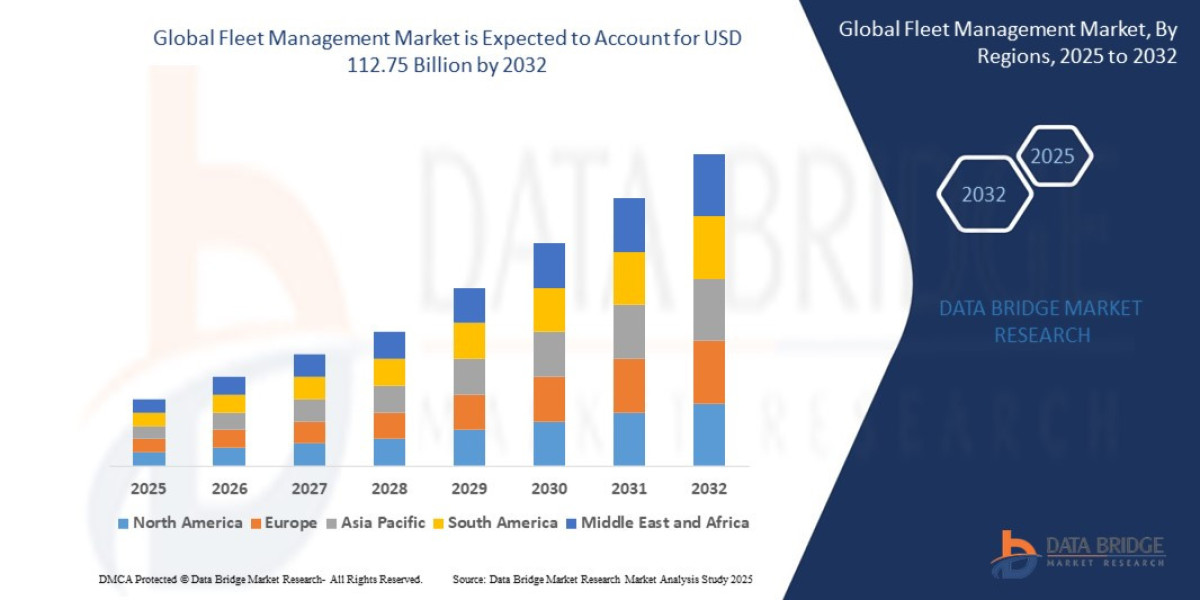Introduction
The global fleet management market has emerged as a cornerstone of modern logistics, transportation, and mobility ecosystems. As businesses increasingly rely on efficient transportation networks to manage operations, the need for advanced fleet management systems has intensified. Fleet management encompasses a wide range of activities, including vehicle tracking, driver management, maintenance scheduling, route optimization, and fuel management. Its goal is to improve operational efficiency, reduce costs, enhance safety, and ensure regulatory compliance across commercial and public transportation fleets.
In today’s digital economy, fleet management is no longer a luxury but a strategic necessity. The rapid adoption of connected vehicles, telematics, and Internet of Things (IoT) technologies has revolutionized how companies monitor and manage their fleets. Governments and private enterprises are also leveraging these systems to optimize resources and reduce environmental impact.
This market research article provides a comprehensive overview of the global fleet management market, covering its current landscape, major drivers, challenges, segmentation, competitive dynamics, and future outlook. It also explores how digital transformation, sustainability initiatives, and intelligent transportation systems are shaping the market’s evolution.
Source - https://www.databridgemarketresearch.com/reports/global-fleet-management-market
Market Overview
The fleet management market refers to the integration of technologies, software, and services that enable organizations to effectively manage and optimize their fleets. It includes a wide range of solutions such as telematics, GPS tracking, fuel management, maintenance scheduling, and driver performance analysis. These solutions are increasingly being used across industries like transportation and logistics, construction, manufacturing, retail, and government sectors.
Historically, fleet management was a manual process involving spreadsheets and basic vehicle logs. However, with the rise of digitalization, the industry has undergone a massive transformation. The introduction of real-time data analytics, automation, and AI-powered insights has enhanced decision-making capabilities, allowing companies to maximize asset utilization and minimize downtime.
Currently, the market is witnessing robust growth due to the proliferation of smart mobility technologies and the expansion of e-commerce logistics. The rise in vehicle ownership for commercial purposes and the increasing emphasis on sustainability are further fueling market expansion.
While specific statistics vary by region, the market is experiencing a healthy compound annual growth rate (CAGR), reflecting strong adoption across both small and large enterprises. North America and Europe currently dominate the market, while Asia-Pacific is witnessing the fastest growth due to rapid industrialization, rising fuel costs, and government-led digital initiatives.
Market Drivers and Opportunities
The fleet management market is primarily driven by a combination of technological innovation, economic efficiency, and regulatory pressures.
A key growth driver is the increasing adoption of telematics and IoT-based solutions. These technologies allow businesses to collect and analyze real-time data on vehicle location, driver behavior, and engine health. Such insights enable predictive maintenance, improved route planning, and cost savings through fuel optimization.
Another major factor is the expansion of e-commerce and last-mile delivery services, which has created unprecedented demand for fleet efficiency and reliability. Logistics companies are turning to fleet management software to streamline operations and enhance delivery accuracy, particularly in urban environments.
Rising fuel prices and environmental concerns are also encouraging fleet operators to adopt smart solutions that reduce fuel consumption and carbon emissions. Governments worldwide are supporting this trend through green fleet initiatives and incentives for electric vehicle (EV) adoption.
Additionally, the integration of Artificial Intelligence (AI) and Big Data presents new opportunities. AI-powered analytics can forecast maintenance needs, identify unsafe driving patterns, and automate scheduling tasks, enhancing operational safety and productivity.
Emerging markets offer significant untapped potential. As small and medium enterprises (SMEs) recognize the cost benefits of digital fleet management systems, adoption rates are expected to surge. Furthermore, the transition toward electric and autonomous vehicles presents new growth avenues for fleet management vendors to expand their solutions into charging infrastructure monitoring and autonomous fleet coordination.
Market Challenges and Restraints
Despite strong growth potential, the fleet management market faces several challenges that may slow its progress.
One of the key restraints is the high implementation cost associated with advanced fleet management solutions. Small and medium-sized enterprises, in particular, may find it difficult to afford initial setup costs, software integration, and hardware installations.
Data privacy and cybersecurity concerns also pose major challenges. As fleet management systems rely heavily on connected technologies and cloud-based platforms, they become susceptible to cyber threats and data breaches. Ensuring robust cybersecurity measures remains a top priority for solution providers and fleet operators alike.
Complex regulatory frameworks across regions further complicate market expansion. Compliance with varying safety, emissions, and data protection laws can be burdensome, particularly for multinational logistics companies operating across borders.
Moreover, lack of digital literacy in developing regions and limited access to high-speed internet infrastructure hinder the adoption of real-time tracking and analytics tools.
Finally, the ongoing shortage of skilled drivers and technicians adds pressure to fleet operators. Even with advanced systems in place, human expertise is critical for effective implementation and response. Overcoming these barriers requires investment in education, standardized regulations, and affordable technology solutions.
Market Segmentation Analysis
The fleet management market can be analyzed across multiple dimensions, including solution type, end-user industry, deployment model, and regional distribution.
By Solution Type
The market includes vehicle tracking, fuel management, telematics, maintenance management, driver management, and safety & compliance solutions.
Vehicle tracking dominates the market, enabling real-time visibility into fleet operations.
Telematics systems are gaining traction for their role in data-driven decision-making.
Driver management solutions are increasingly adopted to monitor behavior and enhance safety.
By End-User Industry
Key sectors utilizing fleet management systems include transportation and logistics, construction, energy, retail, government, and manufacturing.
The transportation and logistics sector remains the largest end-user due to the high volume of commercial vehicle fleets.
Construction and mining industries use fleet management for equipment tracking and preventive maintenance.
Public sector fleets, including municipal services, are also integrating digital platforms to improve efficiency and transparency.
By Deployment Model
Fleet management solutions are available as on-premise and cloud-based systems.
Cloud-based solutions are witnessing rapid growth due to their scalability, flexibility, and cost-effectiveness.
On-premise systems continue to appeal to large enterprises seeking full control over their data.
By Regional Insights
North America leads the market, supported by advanced technological infrastructure, stringent safety regulations, and widespread telematics adoption.
Europe follows closely, with strong emphasis on sustainability and electric fleet integration.
Asia-Pacific is the fastest-growing region, driven by expanding logistics networks, urbanization, and government-backed smart city projects.
Latin America and the Middle East are emerging markets, where improvements in road infrastructure and digitalization are boosting demand for fleet management systems.
Competitive Landscape
The fleet management market is moderately consolidated, with a mix of global technology giants, telematics providers, and emerging startups. Key players are focusing on innovation, strategic partnerships, and product diversification to strengthen their competitive positions.
Prominent companies include telematics pioneers, software developers, and cloud service providers that offer comprehensive fleet management ecosystems. These firms continuously invest in research and development to integrate next-generation technologies such as artificial intelligence, machine learning, and predictive analytics.
Recent years have seen numerous mergers, acquisitions, and collaborations aimed at expanding service portfolios and geographic presence. For instance, partnerships between fleet management software providers and vehicle manufacturers are enabling deeper integration of telematics directly into vehicles.
Many companies are also emphasizing sustainability and green fleet solutions, offering features like electric vehicle monitoring, carbon tracking, and fuel optimization. Cloud-based platforms are becoming standard due to their ability to provide real-time data access across devices.
In this competitive landscape, differentiation is achieved through innovation, customer support, and customization. Companies that offer user-friendly interfaces, advanced analytics, and seamless integration with enterprise resource planning (ERP) systems are more likely to maintain a competitive edge.
Future Outlook and Trends
The fleet management market is set for continued expansion over the next decade, driven by technological innovation, regulatory support, and evolving business models.
A key trend shaping the future is the integration of Artificial Intelligence and predictive analytics. These technologies will enable fleets to anticipate maintenance needs, prevent accidents, and reduce operational costs through real-time insights.
The rise of connected and autonomous vehicles will transform fleet management operations. As vehicles become increasingly automated, fleet management systems will evolve to handle data-driven decision-making, safety monitoring, and autonomous route planning.
Another major trend is sustainability and the electrification of fleets. With global efforts to reduce carbon emissions, electric and hybrid vehicles are expected to dominate commercial fleets in the coming years. Fleet management software will play a vital role in optimizing charging schedules, monitoring battery health, and managing energy consumption.
Blockchain technology is also emerging as a promising solution for improving transparency and security in fleet operations, especially in logistics and supply chain management.
Regionally, Asia-Pacific and Europe are likely to experience the fastest growth, driven by urban mobility solutions and smart city initiatives. Meanwhile, North America will continue to lead in innovation and technology adoption.
Overall, the fleet management market will evolve from traditional vehicle monitoring to a fully integrated, AI-powered mobility ecosystem.
Conclusion
The fleet management market stands at the forefront of the global shift toward digital transformation, sustainable mobility, and intelligent logistics. Its ability to enhance efficiency, safety, and profitability makes it an indispensable component of modern transportation networks.
As businesses continue to prioritize real-time data, predictive maintenance, and environmental sustainability, fleet management systems will play a central role in shaping the future of mobility. Despite challenges like high implementation costs and cybersecurity concerns, continuous technological advancements promise to unlock new opportunities for growth.
For stakeholders, investors, and industry leaders, embracing innovation in fleet management represents not only a competitive advantage but also a pathway toward smarter, greener, and more resilient global operations.
Frequently Asked Questions (FAQ)
What is the current size of the fleet management market?
The fleet management market has seen consistent growth, driven by the rise of telematics, e-commerce logistics, and digital transformation across industries. It continues to expand as organizations seek smarter, data-driven solutions to improve operational efficiency and reduce costs.
What are the key drivers influencing growth in this market?
Major drivers include advancements in IoT and AI technologies, increased demand for vehicle tracking, and government regulations emphasizing safety and emissions control. The rapid expansion of logistics and delivery services also fuels growth.
Which regions dominate the fleet management market?
North America currently leads due to its technological maturity and regulatory environment, followed by Europe. Asia-Pacific is the fastest-growing region, propelled by urbanization, industrial expansion, and adoption of digital logistics systems.
Who are the major players in the industry?
The market features global technology providers and telematics companies offering integrated solutions. These include major corporations and innovative startups focusing on AI, data analytics, and connected vehicle ecosystems.
What are the latest trends shaping the future of this market?
Trends include the adoption of electric and autonomous vehicles, AI-driven predictive maintenance, blockchain-enabled transparency, and sustainability-focused fleet operations.
What challenges could slow down growth in this sector?
Challenges include high setup costs, data security concerns, complex regional regulations, and limited internet infrastructure in developing areas.
How can businesses benefit from investing in the fleet management market?
Businesses can achieve significant benefits such as reduced fuel costs, improved route efficiency, enhanced driver safety, and data-driven decision-making. Investing in fleet management solutions also supports sustainability goals and operational scalability.
Browse More Reports:
Global Hummus Market
Global Hypertension Management Devices Market
Global Industrial Metrology Market
Global Lab Automation Market
Global Life Science Instrumentation Market
Global Liquid Analytical Instrument Market
Global Medical Imaging Phantoms Market
Global Methylene Diphenyl Di-Isocyanate (MDI) Market
Global Microfluidics Market
Global Military Robots Market
Global Mixed Xylene Market
Global Mobile Value Added Services (VAS) Market
Global Network-as-a-Service (NaaS) Market
Global Neurovascular Embolization Devices Market
Global Nitrogen-Fixing Biofertilizers Market
Global Omega 3 for Food Ingredients Market
Global Optical Coherence Tomography (OCT) Market
Global Organic Cosmetics Market
Global Organic Honey Market
Global Paper Shredder Market
About Data Bridge Market Research:
An absolute way to forecast what the future holds is to comprehend the trend today!
Data Bridge Market Research set forth itself as an unconventional and neoteric market research and consulting firm with an unparalleled level of resilience and integrated approaches. We are determined to unearth the best market opportunities and foster efficient information for your business to thrive in the market. Data Bridge endeavors to provide appropriate solutions to the complex business challenges and initiates an effortless decision-making process. Data Bridge is an aftermath of sheer wisdom and experience which was formulated and framed in the year 2015 in Pune.
Contact Us:
Data Bridge Market Research
US: +1 614 591 3140
UK: +44 845 154 9652
APAC : +653 1251 975
Email:- corporatesales@databridgemarketresearch.com


